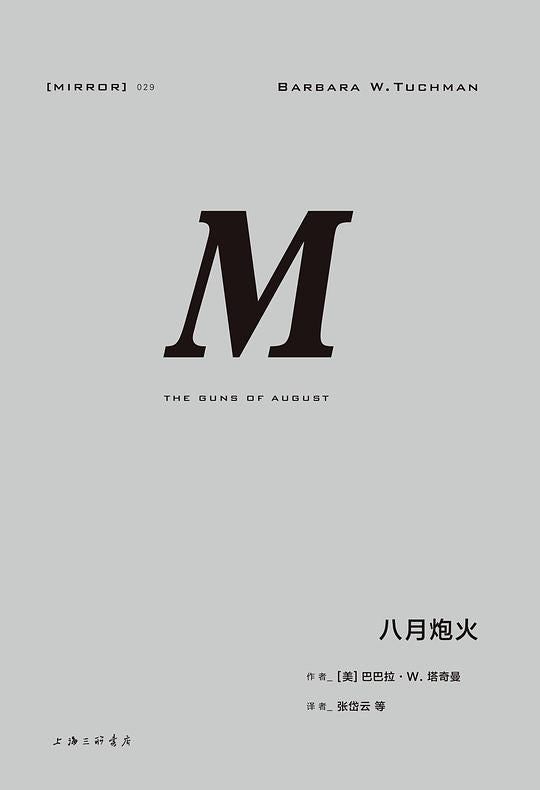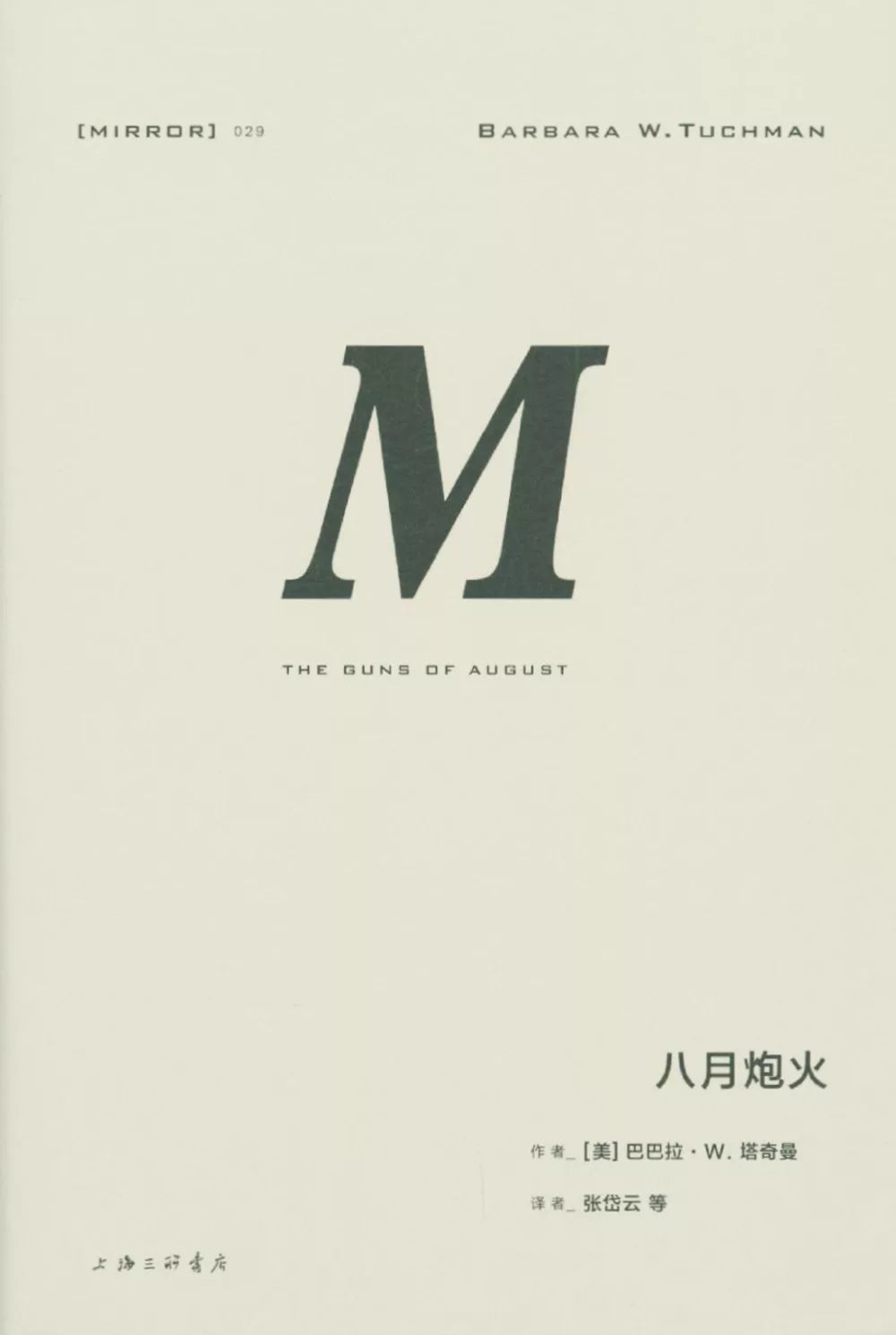1
/
of
2
August bombardment
August bombardment
Barbara Tuchman Zhang Daiyun et al. 译
Regular price
$39.99 USD
Regular price
Sale price
$39.99 USD
Unit price
/
per
Low stock
Couldn't load pickup availability
About Book
About Book
The Guns of August
It’s such a brilliant World War I classic that even the Pulitzer Prize committee took a “detour” to award it.Author Barbara Tuchman is known as an "artist among historians" and her writing is immersive and fascinating.
What led the world into this "impossible" war? President Kennedy drew lessons from history to resolve the US-Soviet crisis.
【Editor's Recommendation】
★ This Pulitzer Prize-winning classic uses brilliant writing to show how the First World War, the end of the imperial era, began and quickly descended into a stalemate. It asks what made emperors, politicians, and generals embark on this "impossible" war, influencing decision-makers in the United States, Britain and other countries at the height of the Cold War, and is also profoundly inspiring to the world today.
★ The book restores historical scenes with a suspenseful narrative style and highly literary brushstrokes, making people feel as if they are there; it delves into materials such as letters, telegrams, diaries and even love letters, leading readers into the hearts of people at the time, and portrays flawed decision-makers in a very humane way.
★ Highly recommended by William Shirer, John King Fairbank, President Kennedy, The New York Times, The Wall Street Journal, The New Yorker, The Guardian and others, with a special introduction by Pulitzer Prize winner and renowned historian Robert Massey.
★ A selection of 42 precious photos of key figures and wartime scenes of World War I; newly drawn battle maps of 10 key battles.
★ Liang Wendao, Liu Yu, Xiong Peiyun and Xu Zhiyuan co-edited this book - Part 1 of the "MIRROR" series (029) - Keep an open mind and non-utilitarian eyes to see the richness and complexity of the world.
【Expert Recommendation】
One of the best books of our time...it kept me hooked from beginning to end.
—William Shirer, author of The Rise and Fall of the Third Reich. "The Guns of August" was an instant hit upon its release, receiving widespread reviews and word-of-mouth, attracting thousands of readers. President Kennedy even ordered a copy for then-British Prime Minister Macmillan, whose conclusion was that modern politicians must avoid the pitfalls of the August War of 1914. Although the Pulitzer Prize donors had established a rule prohibiting the award of historical works unrelated to the United States, the committee nonetheless found a way to recognize it, awarding the author the "Prize for Nonfiction." "The Guns of August" catapulted the author to fame, her work resonating deeply with readers and written with a fluid and elegant style, but most readers simply needed to know that this new book was written by Barbara Tuchman.
—Robert Massey, historian, Pulitzer Prize winner for "Peter the Great" About a decade ago, I read Barbara Tuchman's "The Guns of August." From the first few pages, I was captivated by her sweeping yet meticulous writing style. ... She meticulously chooses words and phrases, ensuring they are both coherent and engaging; she places great emphasis on creating an atmosphere that immerses the reader. Her books are elegant, brilliant, clean, and free of redundant words, evoking the insight and precision of Caravaggio's writing, while also possessing his unconventional style. ...
In today's Chinese publishing industry, all kinds of crudely produced historical reading materials are everywhere, but vivid, rigorous and conscientious works are rare. Tuchman's works provide the best reference for those authors who are keen on "writing" history.
——Jiang Ming, historian On the eve of the outbreak of the Great War (World War I), the vast majority of intellectuals, financiers and business owners in European countries did not realize that they were only a foot away from the huge crisis that was about to break out. They were completely unaware of the risk of war catastrophe imposed on them by political leaders and military strategists.
The book "August Guns" highlights many thought-provoking historical paradoxes and absurdities. A ruling elite, deeply versed in statecraft and the power balance game, schemed and calculated, yet ultimately found themselves the protagonists of a historical tragedy; their carefully crafted military alliances and political commitments ultimately became gravitational accelerators that escalated the conflict.
— Zhu Yunhan, Academician of the Academia Sinica, Professor of Political Science at National Taiwan University, and Director of the American Political Science Association: Barbara Tuchman's history is self-sustaining and requires no theoretical support. It simply captivates readers, bringing them closer to the past than ever before.
John King Fairbank, renowned American historian and sinologist: "As long as there is sufficient artistry, professional historical works can reach the heights of literature. This book perfectly illustrates this point."
—The New York Times
A brilliant military history, her account of the first month of the First World War is, as Churchill said, "even beyond the reach of drama."
—Newsweek
More dramatic than a novel...superb narration, ingenious structure, elegant prose, and excellent pacing throughout.
—Chicago Tribune
【Content Introduction】
World War I brought the 19th century to an end and marked the beginning of the modern world. As a turning point in history, "the stalemate of that terrible August determined the course of the subsequent war and the conditions for peace, and spurred the interwar period and the outbreak of World War II." Yet, on the eve of the war, the vast majority of European politicians, intellectuals, and business owners failed to realize how close they stood to an impending crisis.
In this Pulitzer Prize-winning classic, Barbara Tuchman, through vivid historical reconstruction, rich detail, and solid historical evidence, brilliantly depicts the buildup to the crisis in August 1914, the outbreak of the war, and the early battles. Tuchman interrogates the forces that led emperors, politicians, and generals to embark on a world war that no one wanted and most believed was impossible. Shortly after the book's publication, the Cuban Missile Crisis, which nearly triggered a nuclear war, occurred. It was the lessons learned from this book that then-President Kennedy helped the United States and the Soviet Union resolve the crisis peacefully. These lessons remain profoundly inspiring today.
Barbara Tuchman's masterful narrative technique draws readers into the stories of contemporary people and events, leaving the reader's mind lost in the known ending and creating a story filled with suspense. Her characterizations are particularly vivid, and she calmly avoids moral judgment and harsh criticism, using a deeply human touch to depict how flawed individuals lead the world to a Greek tragedy-like ending.
Publication Date
Publication Date
2018-08-01
Publisher
Publisher
上海三联书店
Imprint
Imprint
Ideal Country
Pages
Pages
600
ISBN
ISBN
9787542663764
share



